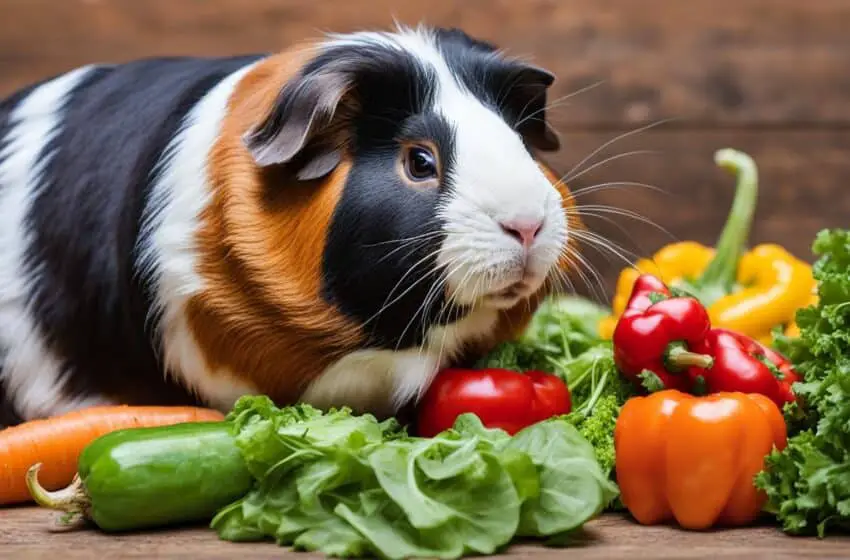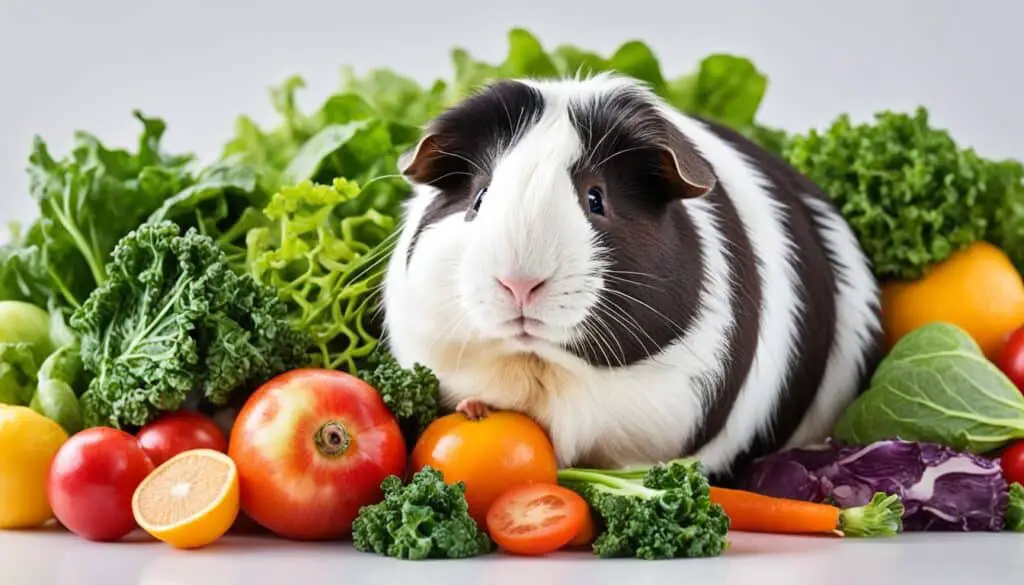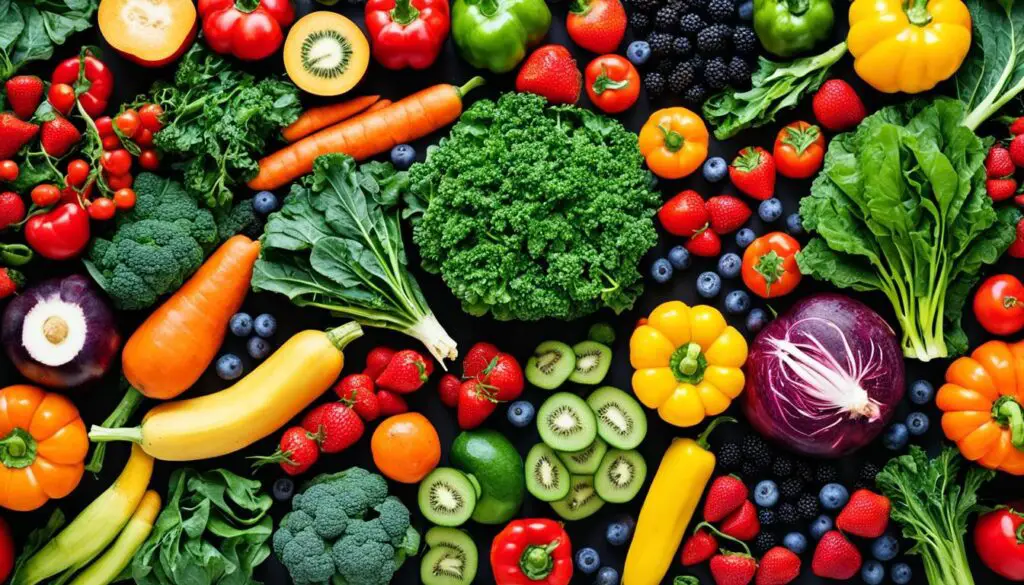Nutritional Care for Pregnant Guinea Pigs

Proper nutrition is vital for the optimal health and development of pregnant guinea pigs. Meeting their specific nutritional needs during this critical time is essential for their well-being and the healthy growth of their offspring.
Key Takeaways:
- Pregnant guinea pigs have increased nutritional requirements for the health of both the mother and the babies.
- A balanced diet with essential nutrients such as vitamins, minerals, proteins, and fiber is crucial during pregnancy.
- Vitamin C, calcium, phosphorus, folate, and beta-carotene are essential nutrients for pregnant guinea pigs.
- Feeding should include unlimited access to fresh water, high-quality hay, measured pellets, and a variety of fresh vegetables and fruits.
- Regular monitoring of weight, veterinary check-ups, and providing a stress-free environment are essential for the well-being of pregnant guinea pigs.
Understanding the Nutritional Needs of Pregnant Guinea Pigs
Pregnant guinea pigs have increased nutritional requirements compared to non-pregnant ones. They need a diet that is rich in vitamins, minerals, proteins, and fiber to support the growth and development of their babies. It is essential to provide a balanced and varied diet that includes the following components:
- Fresh, high-quality hay
- Commercial guinea pig pellets
- A variety of fresh vegetables and fruits
Fresh, high-quality hay is an essential component of a pregnant guinea pig’s diet as it provides the necessary fiber for digestion and helps maintain dental health. It is recommended to offer unlimited access to hay to ensure they have a constant source of this vital nutrient.
Commercial guinea pig pellets are specially formulated to meet the nutritional needs of guinea pigs and should be included in their daily diet. These pellets contain a balanced combination of vitamins, minerals, and proteins essential for the overall health and well-being of pregnant guinea pigs. However, it’s important to follow the manufacturer’s recommendations regarding the appropriate portion size to prevent overfeeding.
In addition to hay and pellets, pregnant guinea pigs should be offered a variety of fresh vegetables and fruits. These provide additional nutrients, such as vitamin C, which is crucial for guinea pigs as they cannot produce it on their own. It is advisable to introduce a range of vegetables and fruits to ensure a diverse and nutritious diet for pregnant guinea pigs.
Remember to introduce new foods gradually and observe how your guinea pig reacts to them. Certain fruits and vegetables, such as those high in sugar, should be given in moderation to prevent weight gain and potential health issues. Providing a varied diet with different colors and textures will help ensure that your pregnant guinea pig receives a wide range of essential nutrients.
“A balanced and varied diet, rich in vitamins, minerals, proteins, and fiber, is crucial for meeting the nutritional needs of pregnant guinea pigs and supporting the growth and development of their babies.” – Dr. Nutrition
To get a better understanding of the nutritional requirements of pregnant guinea pigs, refer to the table below:
| Nutrient | Importance | Food Sources |
|---|---|---|
| Vitamins | Essential for overall health and development | Fresh fruits and vegetables, guinea pig pellets |
| Minerals | Support bone development and various metabolic processes | Fresh vegetables, guinea pig pellets |
| Proteins | Important for tissue growth and repair | Guinea pig pellets, legumes, hay |
| Fiber | Aids digestion and maintains digestive health | High-quality hay, fresh vegetables |

Providing the right balance of nutrients is crucial for the overall health and well-being of pregnant guinea pigs. By understanding their specific nutritional requirements and offering a varied and well-rounded diet, you can ensure the optimal growth and development of their babies, promoting a healthy pregnancy and successful delivery.
Important Nutrients for Pregnant Guinea Pigs
Pregnant guinea pigs require specific nutrients to ensure a healthy pregnancy and successful delivery. Essential nutrients such as vitamin C, calcium, phosphorus, folate, and beta-carotene play a crucial role in supporting the growth and development of both the mother and her babies.
One of the most important nutrients for pregnant guinea pigs is vitamin C. Guinea pigs, unlike humans, cannot produce this vitamin on their own. A deficiency in vitamin C can lead to serious health problems, including scurvy. Therefore, it is vital to provide a diet that is rich in vitamin C to ensure the well-being of pregnant guinea pigs and the optimal development of their babies.
In addition to vitamin C, pregnant guinea pigs also need sufficient amounts of calcium and phosphorus. These minerals are essential for proper bone development in the growing babies. A well-balanced diet that includes calcium-rich foods, such as fresh leafy greens and hay, can help meet these specific needs.
The folate is another essential nutrient for pregnant guinea pigs. Folate plays a vital role in the development of the nervous system and ensures proper growth and functioning. Pregnant guinea pigs should be provided with folate-rich foods, such as dark leafy greens, to support the healthy development of their babies.
Lastly, beta-carotene is crucial for the development of the eyes in both pregnant guinea pigs and their offspring. Foods that are rich in beta-carotene include carrots, sweet potatoes, and bell peppers. Including these vegetables in the diet of pregnant guinea pigs can help promote healthy eye development in their babies.
| Nutrient | Importance | Sources |
|---|---|---|
| Vitamin C | Crucial for overall health and immune system function | Oranges, bell peppers, broccoli |
| Calcium | Necessary for bone development in growing babies | Kale, dandelion greens |
| Phosphorus | Essential for bone and teeth formation | Parsley, pumpkin seeds |
| Folate | Crucial for the development of the nervous system | Spinach, romaine lettuce |
| Beta-Carotene | Important for eye development | Carrots, sweet potatoes, bell peppers |
Providing a diet that contains these essential nutrients is key to meeting the specific needs of pregnant guinea pigs and supporting their overall health and the development of their offspring.

In the next section, we will delve into the feeding guidelines for pregnant guinea pigs, discussing the recommended feeding schedule and the types of foods that should be included in their diet.
Feeding Guidelines for Pregnant Guinea Pigs
Proper feeding is crucial for the health and well-being of pregnant guinea pigs. Meeting their nutritional needs during this time ensures the development of healthy babies. Here are some important guidelines to follow:
1. Fresh Water
Pregnant guinea pigs should have access to fresh water at all times. This helps keep them hydrated and supports their overall health.
2. Unlimited Hay
Good quality hay should be provided to pregnant guinea pigs in unlimited quantities. Hay is an essential source of fiber, aiding in digestion and preventing issues such as gastrointestinal stasis. It also helps wear down their teeth and provides mental stimulation.
3. Measured Pellets
Commercial guinea pig pellets should be given to pregnant guinea pigs in measured amounts according to the manufacturer’s recommendations. These pellets are specially formulated to meet their nutritional needs and should be free of any added sugars or artificial ingredients.
4. Fresh Vegetables and Fruits
Pregnant guinea pigs should be offered a variety of fresh vegetables and fruits daily. These provide important vitamins, minerals, and antioxidants that support their immune system and overall health. However, it is crucial to avoid feeding excessive amounts of sugary fruits and vegetables, as this can lead to weight gain and other health issues.
“A balanced and varied diet is essential for the health of pregnant guinea pigs.”
By following these feeding guidelines, you can ensure that your pregnant guinea pig receives the nutrients she needs for a healthy pregnancy and a successful delivery.
Care Considerations for Pregnant Guinea Pigs
When caring for pregnant guinea pigs, there are several important considerations to keep in mind. These include monitoring their weight, scheduling regular veterinary check-ups, limiting stress, providing nesting materials, and creating a quiet environment.
Monitoring Weight
It is crucial to closely monitor the weight of pregnant guinea pigs throughout their pregnancy. Gradual weight gain is a positive sign, indicating that the mother guinea pig and her babies are healthy and growing properly. If there are sudden weight fluctuations or if the mother is not gaining weight, it may indicate a potential health issue that requires veterinary attention.
Regular Veterinary Check-ups
Scheduling regular veterinary check-ups is essential to ensure the health and well-being of both the pregnant guinea pig and her babies. A veterinarian can perform thorough examinations, monitor the progress of the pregnancy, and address any concerns or complications that may arise. Regular check-ups help identify and address potential issues, ensuring a healthy pregnancy and safe delivery.
Limiting Stress
Stress can have a negative impact on the health and development of pregnant guinea pigs and their babies. It is important to provide a quiet and stress-free environment for the mother guinea pig. Limiting loud noises, sudden movements, and excessive handling can help reduce stress levels. By creating a calm and peaceful atmosphere, we can promote the well-being of the pregnant guinea pig and contribute to the healthy development of her babies.
Nesting Materials
Providing proper nesting materials is crucial for pregnant guinea pigs. Hay and shredded paper are excellent choices for nesting materials as they offer comfort and safety. The mother guinea pig can use these materials to create a warm and cozy nesting area where she can give birth and care for her babies. By providing suitable nesting materials, we can help ensure a comfortable and stress-free birthing experience.
Quiet Environment
A quiet environment is essential for the well-being of pregnant guinea pigs. Loud noises and excessive activity can cause stress and anxiety, which can negatively impact the mother and her babies. Keeping the guinea pig’s living space in a quiet area of the house, away from high-traffic areas or noisy appliances, can help create a peaceful environment. This allows the mother to relax, focus on her pregnancy, and provide the best care for her babies.
By considering these care measures, including weight monitoring, regular veterinary check-ups, stress reduction, nesting materials, and a quiet environment, we can support the health and well-being of pregnant guinea pigs and contribute to a successful and stress-free pregnancy and delivery.
Conclusion
Ensuring the nutritional needs of pregnant guinea pigs is essential for their optimal health and the development of their babies. A well-balanced and varied diet that includes essential nutrients, combined with proper care and a stress-free environment, can significantly contribute to the well-being and successful pregnancy of these adorable pets.
By following the guidelines presented in this article, you can provide your pregnant guinea pig with the necessary nutrition and care for a healthy pregnancy and delivery. Remember to consider their increased nutritional requirements and provide adequate amounts of vitamins, minerals, proteins, and fiber in their diet. Fresh water should be available at all times, and high-quality hay, commercial guinea pig pellets, and a variety of fresh vegetables and fruits should be included in their daily meals.
Additionally, monitoring the weight of pregnant guinea pigs, scheduling regular veterinary check-ups, and creating a calm and stress-free environment are crucial for their well-being. Nesting materials, such as hay and shredded paper, can also help them create a comfortable and safe space for their babies.
By prioritizing their nutritional needs and providing a loving and nurturing environment, you are actively promoting the optimal health and development of your pregnant guinea pig and her precious offspring.
FAQ
What are the nutritional needs of pregnant guinea pigs?
Pregnant guinea pigs have increased nutritional requirements and need a diet rich in vitamins, minerals, proteins, and fiber to support the growth and development of their babies.
What are some important nutrients for pregnant guinea pigs?
Pregnant guinea pigs require specific nutrients such as vitamin C, calcium, phosphorus, folate, and beta-carotene to ensure a healthy pregnancy and successful delivery.
How should I feed my pregnant guinea pig?
Pregnant guinea pigs should have access to fresh water at all times, unlimited high-quality hay, measured amounts of commercial guinea pig pellets, and a variety of fresh vegetables and fruits.
How can I ensure the health of my pregnant guinea pig?
It is important to monitor the weight of pregnant guinea pigs, schedule regular veterinary check-ups, provide a stress-free environment, and offer nesting materials for a comfortable and safe nesting area.



